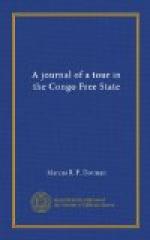There are many native thieves all over the Congo—one of them actually penetrated into the house of Captain Auita at midday in bright sunshine and stole a spear and a native knife. He was however, soon caught and marched off to prison. Trials by ordeal used to be very common among the natives. A favourite method was to give a dose of strychnine to a fowl and if it died, the accused was guilty, but if it lived, he was innocent. The wretched fowl, feeling in any case very ill, walked about wondering at the excitement and followed by the complainant shouting “die, die, die, fowl” and the defendant shouting “live, live, live, fowl.” The strength of the solution was always arranged by the judge so the verdict was known to him beforehand. A curious instrument to take the place of a jury, is a nut through which a piece of fibre has been passed in such a way, that when it is held vertically, the nut slides up and down. By a curious twist of the fibre however, it is possible to prevent the nut falling. At the trial, the nut is raised to the top of the string and if it stays there, the accused is innocent, but if it falls, he is guilty. Here again, the judge can make the machine decide either way at his will.
Among the many objectionable insects of the Congo is the jigger, a kind of sand fly which burrows under the skin, usually of a toe, and deposits eggs in a sack there. Unless these are removed an abscess forms. The natives sit about calmly removing jiggers from each other’s feet with needles, and show considerable skill in this small operation. It is necessary therefore never to move about with bare feet, for the boys carry them into every place.
Much ivory comes into the Post at intervals, the points sometimes weighing 70 or 80 lbs. each. The State preserves the elephant very strictly, and the export duty on tusks above 6 kilos in weight, is 21 frs. per kilo. Still it is not likely that the Congo will continue to yield such large quantities of ivory, for the elephant only bears one offspring in three years and the growth of the baby is very slow. There is a baby elephant here one year old. He stands about 4 feet, 6 inches high, and has no sign of tusks at present. He is fed on rice, milk and bananas and is a playful little fellow. A tame ape here fears the elephant very much and at his approach at once clings to the native who tends him or climbs over his shoulder, so as to place the boy’s body always between himself and the elephant.




